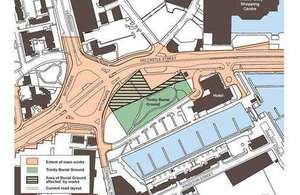Relatives asked to come forward ahead of planned work near burial ground
The Highways Agency’s A63 Castle Street project team is appealing for relatives who think they may have ancestors who are laid to rest at Trinity Burial Ground in Hull, to come forward ahead of a planning application for work in the area.

A63 Castle Street project
The proposed road improvements will affect approximately one third of Trinity Burial Ground, near the Mytongate junction on Castle Street. The public appeal comes before the team submits its planning application (Development Consent Order) to the Planning Inspectorate.
The A63 Castle Street scheme will improve access to the Port of Hull by widening some sections of the road, upgrading the Mytongate junction and building new pedestrian crossings. The scheme also aims to help reduce the impact of the barrier caused by Castle Street between the city centre to the north, and the tourist and recreational developments to the south.
James Holmes, Highways Agency project manager said:
We are doing everything we can to ensure that the road improvement work impacting the Trinity Burial Ground is managed respectfully, with full care and due consideration.
The burial ground closed in 1861. Although there is no legal obligation to contact relatives of burials that are over 100 years old, we feel that the right thing to do is to ask anyone who thinks they may have ancestors laid to rest there to please get in touch with us.
The burial ground is consecrated ground, and the Highways Agency is working closely with representatives from Holy Trinity Church and the Diocese of York to ensure that all appropriate measures and permissions are in place for the planned work.
The Venerable Andy Broom, Archdeacon of the East Riding said:
Although no-one has been buried at Trinity Burial Ground for over 150 years, we’re really glad that the Highways Agency’s team is appealing for descendants of those buried there to come forward.
It’s important that everyone comes together to ensure this necessary work is done in a way that respects those interred in the Burial Ground and their families. The church will be working with the Highways Agency to make sure that all human remains from the affected area of the site are treated with honour, and reburied in the unaffected area of the Burial Ground with an appropriate service.
Once the works are complete, Hull should have beautifully renewed burial ground which will be a focus for commemoration, a place to discover something of the City’s rich history, and an important City-centre refuge for wildlife.
Research of the available records suggests that up to 16,000 burials may be located within the affected area of the burial ground.
Human remains from this area will be exhumed before the main construction programme begins. Any removal and reburial of human remains will be controlled and conducted by a team of trained archaeologists and cemetery exhumation specialists. Although not yet confirmed, it is possible that some of the remains may be analysed - this could help provide information about life in Hull during the eighteenth and nineteenth centuries.
Work in the burial ground, thought to be the largest mass exhumation to be conducted outside of London, is expected to start in 2016/17. Some preliminary ground investigation and evaluation surveys will be carried out in advance.
If you have ancestors who you think may be buried in Trinity Burial Ground, and you have any queries regarding these proposals, please contact the project team by calling 0113 2836805 or by email.
For further information visit the A63 project website where you can also register for regular updates on the scheme, including the Trinity Burial Ground plans.
General enquiries
Members of the public should contact the Highways Agency Information Line on 0300 123 5000.
Media enquiries
Journalists should contact the Highways Agency press office on 0844 693 1448 and use the menu to speak to the most appropriate press officer.